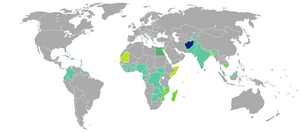Externalization (migration) facts for kids
Externalization is a way that some rich countries try to stop asylum seekers and other people moving from reaching their borders. They often do this by working with other countries or private companies. Countries like Australia, Canada, the United States, the European Union, and the United Kingdom use externalization.
It's like an invisible wall, stopping people far away from the country's actual border. This can include rules about visas, fines for airlines or ships, or deals with countries where people start their journey or pass through.
Contents
How Countries Use Externalization
Visa Rules and Carrier Fines
One way countries use externalization is through strict visa rules. A visa is a special stamp in your passport that lets you enter a country. Countries that have many people leaving as refugees often have the hardest visa rules. This means it's very difficult for people from those countries to travel legally.
Another part of this is called "carrier sanctions." These are fines given to transportation companies, like airlines or shipping lines. They get fined if they carry passengers who don't have the right visas or papers to enter a country. This makes it harder for people seeking safety to even get on a plane or ship to reach a country where they could ask for help. If they can't get there legally, they might try dangerous, unofficial ways to travel.
Discouraging Travel with Marketing
Sometimes, countries use marketing campaigns to discourage people from trying to travel without permission. These campaigns often share messages about the dangers and difficulties of irregular migration. The goal is to make people think twice before starting a journey that might be risky or not allowed.
Stopping Boats in International Waters
Another method is stopping boats in international waters. This means stopping them before they even get close to the country's border. Sometimes, a country's own boats will stop and turn back migrant boats. This is called a "pushback." Other times, a different country might stop the boats and send them back to where they came from. This is known as a "pullback."
Deals with Other Countries
Countries also make agreements with other nations to help control migration. These agreements can be voluntary, but sometimes richer countries use their power to get poorer countries to agree. This can feel a bit like neocolonialism, where powerful countries still influence less powerful ones.
However, these deals don't always work perfectly. The countries helping to stop migration might have different goals or values. For example, countries that want to limit immigration might not want to offer easier travel rules to the countries helping them. Also, many countries in Africa and Latin America believe in freedom of movement for their people. So, helping to stop migration might go against their own beliefs and interests.
Over time, these externalization policies have spread. They now involve countries far away, not just neighboring ones. This means the countries trying to control migration depend a lot on other nations being willing and able to cooperate.
 | Mary Eliza Mahoney |
 | Susie King Taylor |
 | Ida Gray |
 | Eliza Ann Grier |


